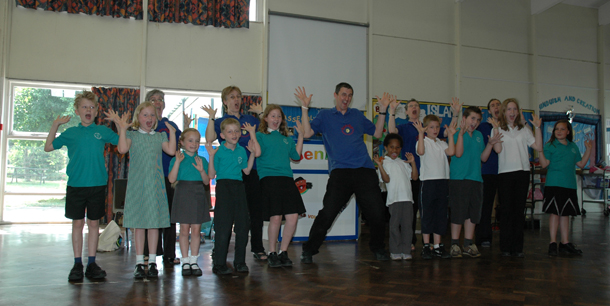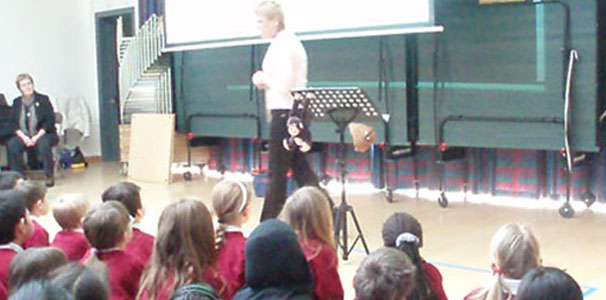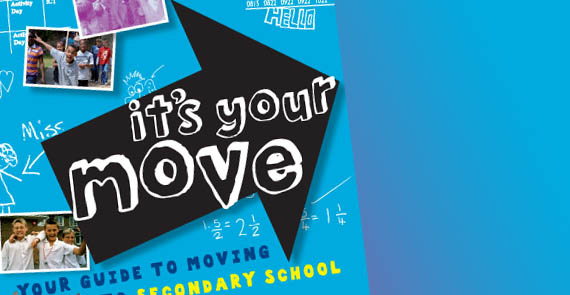Aim
To help pupils understand that there are different ways of looking at life; and to consider Jesus’ claim that he is the source of life in all its fullness.
Bible base
John 10:10; 14:6 – Jesus came to give us life.
You will need:
5 large cards – 4 of which should show the word ‘life’ written in 4 different ways; and the fifth showing the word ‘JESUS’:
- Card 1 – l I f e
- Card 2 – l I F e
- Card 3 – L i f e
- Card 4 – L I f E
- Card 5 – JESUS
Content
Introduction
Begin with a simple word association game, where two volunteers must say words associated with a given theme alternately (eg for ‘holidays’, your volunteers might say words like: ‘sand’ , ‘sun’, ‘fun’ etc). As soon as one person hesitates, call up someone else to take over. Use other themes, like: ‘school’, ‘breakfast’, ‘sport’ etc. Then introduce the theme ‘life’. They will probably find this more difficult.
Life
Comment that it’s interesting how we find something we all have so difficult to describe! Say that you can think of at least four ways of describing life. Suggest that maybe they can identify with some of these ways of looking at life.
l I f e
1. Display Card 1 which shows the word ‘life’ written with a capital ‘I’. Say that some people spell ‘life’ this way. Explain that ‘I’, ‘me’ and ‘my’ are three of the most commonly used words in the English language. The person who sees life in this way puts him or herself first in life. They are number 1! There are things they want to do, places they want to see, money they want to make – and woe betide anyone who gets in their way! This person is a self-made man (or woman) and proud of it! They can look after themselves and don’t need anyone!
2. Tell the following story: A man was walking along a cliff. He slipped and fell and was hanging on for dear life, to a small bush, on the edge of the cliff. Although he was an atheist, he called out, in desperation, ‘Is anybody there?’ To his amazement, he heard a reply: ‘Yes, I’m here.’ He cried out again, ‘What do you want me to do?’ The voice said, ‘Let go of the bush, and I’ll save you.’ He paused for a moment and then cried out, ‘Is anybody else there?’ He couldn’t take the risk of trusting his life to anyone!
l I F e
1. Display Card 2 which shows the word ‘life’ written with the letters ‘I’ and ‘F’ as capitals. Say that some people spell ‘life’ in this way – with a big ‘IF’ in the middle. This kind of person says things like:
- If there is a God, why is there so much suffering?
- If there is a God, why did my loved one have to die?
- If there is a God, why doesn’t he prove it?
- If I can just get through my exams, then I’ll have time for God.
- If God gets me that job I want, or that girl/boyfriend, then I’ll believe in him.
2. Tell this story:
Tommy was saying his prayers one night and his mum was with him. He prayed, ‘Dear Lord, if you get me that mountain bike, I’ll be good for a whole week.’ His mum stopped him and told him that wasn’t the sort of prayer God wanted to hear. ‘You can’t do deals with God,’ she said.
Next week he was praying again, and this time he prayed, ‘Dear Lord, if you get me that mountain bike, I’ll be good for two whole weeks.’ His mum stopped him again and repeated the same warning.
Some time later, his mum was doing some spring cleaning. In the airing cupboard, under some towels, she found a statue of Mary. She wondered if Tommy was behind this, so she went into his room to see if she could find him. He wasn’t there, but on the window-sill was a note in his handwriting which said, ‘Right, God, if you ever want to see your mother again…’!
L i f e
1. Display Card 3 which shows the word ‘life’ written with the letter ‘L’ as a capital. Say that some people spell ‘life’ in this way with a capital ‘L’, because, after all, ‘we’re all learning, aren’t we?’. They say things like:
- ‘I mean, no one’s perfect are they?’
- ‘We can only try our best, can’t we?’
This kind of person treats life a bit like a driving test. It’s as if they believe at the end of time, God will tot up the number of points they got and, hopefully, they will just about manage to scrape into heaven! But unfortunately, some of us just don’t learn!
2. Tell this story: There was a man who was doing a parachute jump. He pulled the cord – nothing happened. He pulled the emergency cord, and still nothing happened. As he was heading towards earth at a hundred and twenty miles an hour, he passed another man on the way up!
‘Hey’ he shouted at him, ‘Do you know anything about parachutes?’
‘No!’ the man replied, ‘Do you know anything about gas ovens?’
We’re all learners!
L I f E
1. Display Card 4 which shows the word ‘life’ written with the letters ‘L’, ‘I’ and ‘E’ as capitals. Say that some people spell ‘life’ in this way because, as we all know, there are many voices wanting to get our attention out there in the world, and we have to try to decide which is the truth and which are lies. Sadly, some people have ended up living their lives according to the lies they have hard and believed, like:
- ‘You’re worthless, you’ll never be any good,’ ‘You’ve got to look good to be accepted.’
- ‘Go on, do it, everyone does it.’
- ‘Go on, take it, it won’t do you any harm.’
2. Tell this story:
There was a person who jumped out of a sixteen storey building just to see what it felt like. Half-way down, he shouted to his friends, ‘See! So far so good!’
Application
1. Say that Christians aren’t very good spellers, because they spell ‘life’ like this: JESUS (display card 5 which shows the word ‘Jesus’). It’s not because they can’t spell, but because Jesus said things like:
- ‘I am the way, the truth, and the life’ (John 14:6, Good News Bible).
- ‘I have come…that you might have life – life in all its fullness’ (John 10:10, Good News Bible).
It was as if Jesus was saying, ‘This is life, knowing me!’ These are amazing claims that are worth checking out.
2. Conclude by challenging pupils to ask themselves: ‘What am I going to base my life on?’


